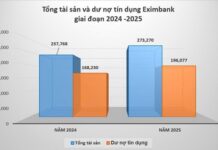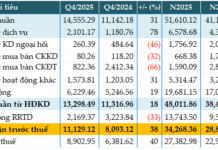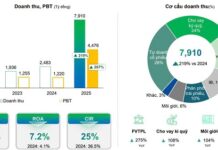
Governor of the State Bank of Vietnam, Nguyen Thi Hong (Photo: Chinhphu.vn)
On the morning of October 4th, at the Government Headquarters, a meeting was held with business representatives on the occasion of Vietnamese Entrepreneurs’ Day, chaired by the Prime Minister.
Speaking at the conference, Governor Nguyen Thi Hong expressed her appreciation for the significant contributions of Vietnamese enterprises to the country’s socio-economic development.
According to the Governor, the State Bank of Vietnam (SBV) has always been aware of the importance of the business environment for enterprises. Therefore, over the years, the SBV has remained steadfast and overcome numerous challenges to contribute to macroeconomic stability, inflation control, and stability in the monetary and foreign exchange markets.
Additionally, the SBV has implemented and focused on administrative reforms, ranking among the top in the Par Index rankings, thereby improving the business environment for Vietnamese enterprises.
Secondly, the banking sector has always considered enterprises as partners because they are both depositors and borrowers within the banking system. All solutions and policies of banking activities are directed towards enterprises and people, following the spirit of the Government and the Prime Minister’s instructions.
“Whenever the economy faces challenges, and people and businesses encounter difficulties, the banking system resolutely implements supportive solutions,” emphasized Governor Nguyen Thi Hong, referring to measures taken during the COVID-19 pandemic and other recent upheavals, such as debt restructuring, maintaining debt groups, and waiving interest and fees for businesses.
The head of the banking sector also mentioned that banks, as businesses themselves, deeply empathize and commit to supporting enterprises. They have allocated financial resources, amounting to approximately 60 trillion VND, for interest and fee reductions, despite not receiving any financial support policies themselves.
Thirdly, while enterprises have aspirations to contribute to the country, credit institutions share this sentiment. However, apart from their typical business objectives, credit institutions, as financial intermediaries, must adhere to financial principles and discipline, ensuring the safety of each financial institution and, by extension, the stability of the entire banking system.
“We delineate the safety boundaries of credit institutions to maintain a stable business environment for enterprises and people,” the Governor emphasized.
According to the Governor, as the monetary management authority and the regulator of credit institutions, the SBV aims to lower interest rates and provide sufficient credit. However, its mission also includes contributing to inflation control and macroeconomic stability, ultimately fostering a conducive business environment for enterprises. The SBV seeks the understanding of enterprises regarding the perspective of credit institutions and the SBV’s mission for the greater economic good.
Fourthly, the SBV believes that a comprehensive assessment of the current state of Vietnamese enterprises and breakthrough solutions for the development of leading enterprises and their satellite companies is necessary.
Vietnam has over 930,000 operating enterprises, of which 98% are small and medium-sized. While there is one law and five decrees to support small and medium-sized enterprises, the actual implementation has not met expectations. A realistic assessment is required to devise effective solutions. For instance, as mentioned by the Chairman of the Association of Small and Medium-sized Enterprises, there is a need for financial resources, such as guarantees for enterprises, to address capital-related issues.
Fifthly, regarding the issue of 0% interest rates, in the past, Vietnam experienced a high level of dollarization. During 2007-2008, the economy had a surplus of foreign currency, but each sector hoarded foreign currency without selling it. The SBV had to sell foreign currency, causing significant fluctuations in the foreign exchange market and negatively impacting the psychology of foreign investors and the business environment. Therefore, since 2016, the SBV has implemented synchronous solutions to eliminate the psychology of foreign currency hoarding, including the 0% USD interest rate policy. This policy has contributed to stabilizing the exchange rate and the foreign exchange market, and it is considered a bright spot in enhancing the country’s credit rating.
Governor Nguyen Thi Hong also emphasized that Vietnam has a large number of banks, and over 90% of banking services are now provided through digital channels. Consequently, there are no obstacles for individuals and enterprises in accessing and utilizing these services.
The New Regulations on Interest Rates for US Dollar Deposits
The State Bank has issued Circular 46/2024/TT-NHNN, introducing new regulations on interest rates for US dollar deposits by organizations and individuals at credit institutions and foreign bank branches.
“The ACB Chairman Seeks More Detailed Guidelines for the Implementation of the 2024 Land Law.”
The leaders of joint-stock commercial banks attribute the country’s economic growth and controlled inflation to the effective coordination between monetary and fiscal policies. This harmonious relationship has been pivotal in achieving macroeconomic stability and keeping inflation within the targeted range.
The Power of Collaboration: Leading Enterprises Unite for National Development
On the morning of September 21, Prime Minister Pham Minh Chinh chaired a conference at the Government Headquarters. The meeting was attended by members of the Government Standing Committee and prominent businesses to discuss solutions for socio-economic development in the country.









































